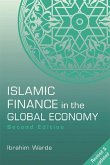A comprehensive discussion of the ethical issues facing wealth creation in the Muslim world Debt finance involving interest payments - the standard method in the global economy - goes against Qur'anic teaching and Shariah law. Wealth creation is therefore one of the greatest challenges facing Muslims and the Islamic world. This book explores the longer term issues of Islamic capital accumulation and its contribution to the development of Muslim societies in the East and West. Although many of these societies remain poor, it is shown that there is much positive experience to learn from - especially that wealth creation is most successful when the institutions created to harness and deploy funds share the values of the societies they serve. It can be seen that adherence to religious values brings social development, and that moral financing makes good business sense. The potential for Islamic mortgages and insurance, and the scope for Islamic venture capital funding and other forms of equity financing are explored by a range of contributors drawing on a wealth of varied experiences from Malaysia to Iran, Kuwait, Egypt and Sudan.
Debt finance involving interest payments - the standard method in the global economy - goes against Qur'anic teaching and Shariah law. Wealth creation is therefore one of the greatest challenges facing Muslims and the Islamic world. This book explores the longer term issues of Islamic capital accumulation and its contribution to the development of Muslim societies in the East and West. Although many of these societies remain poor, it is shown that there is much positive experience to learn from - especially that wealth creation is most successful when the institutions created to harness and deploy funds share the values of the societies they serve. It can be seen that adherence to religious values brings social development, and that moral financing makes good business sense. The book includes: * evaluation of Asian Islamic banking experiences * assessment of Islamic banking efficiency and service quality * analysis of Islamic insurance and risk management, and equity finance and venture capital Countries covered include: Iran Pakistan Sudan Kuwait Egypt Malaysia Bahrain Jordan Saudi Arabia The book provides a comprehensive discussion of the various aspects of Islamic finance, focusing on key countries and institutions in a coherent manner and bringing both breadth and depth to the subject. Key Features: * First book to bridge the gap between Islamic economic theory and financial practice * Considers risk management in accordance with Islamic law by exploring Islamic mortgages and insurance * Looks at equity finance, venture capital and the stock market from an Islamic perspective * Offers detailed case studies of country experiences of Islamic capital formation and wealth accumulation * Includes a glossary of Arabic terms
Hinweis: Dieser Artikel kann nur an eine deutsche Lieferadresse ausgeliefert werden.
Debt finance involving interest payments - the standard method in the global economy - goes against Qur'anic teaching and Shariah law. Wealth creation is therefore one of the greatest challenges facing Muslims and the Islamic world. This book explores the longer term issues of Islamic capital accumulation and its contribution to the development of Muslim societies in the East and West. Although many of these societies remain poor, it is shown that there is much positive experience to learn from - especially that wealth creation is most successful when the institutions created to harness and deploy funds share the values of the societies they serve. It can be seen that adherence to religious values brings social development, and that moral financing makes good business sense. The book includes: * evaluation of Asian Islamic banking experiences * assessment of Islamic banking efficiency and service quality * analysis of Islamic insurance and risk management, and equity finance and venture capital Countries covered include: Iran Pakistan Sudan Kuwait Egypt Malaysia Bahrain Jordan Saudi Arabia The book provides a comprehensive discussion of the various aspects of Islamic finance, focusing on key countries and institutions in a coherent manner and bringing both breadth and depth to the subject. Key Features: * First book to bridge the gap between Islamic economic theory and financial practice * Considers risk management in accordance with Islamic law by exploring Islamic mortgages and insurance * Looks at equity finance, venture capital and the stock market from an Islamic perspective * Offers detailed case studies of country experiences of Islamic capital formation and wealth accumulation * Includes a glossary of Arabic terms
Hinweis: Dieser Artikel kann nur an eine deutsche Lieferadresse ausgeliefert werden.








